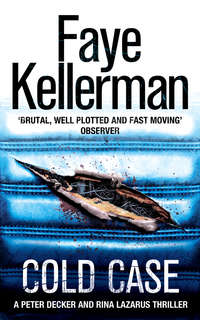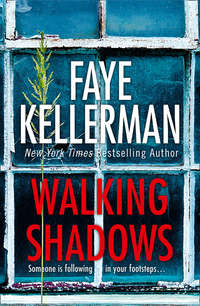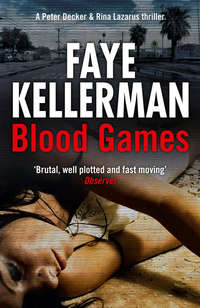
Полная версия
Grievous Sin
“Then why does she have such hostility toward me?”
“Probably because you’re treading on her turf. It’s irrational. From what you’ve described, I’m not saying the woman’s without problems.”
“Maybe she resents you and Rina because you’re not Christians.”
Decker shrugged. “I don’t think so. I think she’s just territorial.”
“Darlene isn’t like that at all.”
“Are we talking about the same Darlene who left you in charge of a dozen newborns?”
“She didn’t leave me in charge.”
“Cindy—”
“Daddy, better I be in charge than some of the staff during the graveyard shift. It gets real weird here at night.”
Again Decker paused. “What exactly do you mean by weird?”
“Darlene said because of the budget cuts, the hospital is forced to use a lot of temporaries and floaters. Some of them are very strange. Believe me, we’re very lucky to have Hannah under Darlene’s care.”
“Well, that was confidence-inspiring.” Decker bit the ends of his mustache. “Maybe I should check Hannah out today. The pediatrician told me medically she could be discharged. But I really wanted her to stay overnight. It’s going to be another day before Rina can come home, and I wanted to give her a chance to hold Hannah. I didn’t want her to feel isolated from everything. But you’re a sharp kid. If you say it’s weird, I’ll take both of them out of here.”
Cindy looked pained with the responsibility of decision. “Dad, I’m real tired. Maybe I’m exaggerating.”
Decker sat back down. “Good Lord, do I know that feeling.”
“Daddy, I’ll watch Hannah again tonight. Last thing I want is to take the baby away from Rina.” Cindy hesitated. “How’s she doing?”
Decker didn’t answer.
“Daddy?”
Decker ran his hands over his face. “There’ve been a few complications, but she’ll be all right.”
“Serious complications?”
“She’ll be all right,” Decker said again.
“You’re hiding something from me, aren’t you?”
Decker looked at his daughter. “I just don’t like talking about Rina when she’s not around.”
“You’re right. I don’t mean to be intrusive.”
Decker put his arm around his daughter. “Princess, go tell the nurse to wheel the baby out. Then I want you to go home and get some rest. Come back here when you’re refreshed. I really do need your help.”
“Daddy, it’s my pleasure being able to help you.” Cindy ran her toe along the ground. “Being able to be with you like this has been really nice. You and I talking like friends. I know you’re my father first. But it’s nice to be friends with your dad, right?”
Decker tousled Cindy’s rust-colored hair. “Yes, it’s very nice.”
They had moved her to a regular hospital room—an indication that she was no longer in danger. Now she was just a mere patient. They’d look after her for a day or maybe two, then she’d be released. No matter that she’d leave a shell of what she’d been. That didn’t concern the hospital. As long as her heart was beating and her breathing was steady, she’d be sent home.
She didn’t look at Rabbi Schulman. From a single glance, Rina knew Peter had told him. One part of her felt angry and betrayed. But the other side whispered relief. The emotional pain was too much to bear alone, too much to comprehend. Why was happiness always ripped away from her? After Yitzchak had died, she thought she’d never love again. But Hashem knew better. She met Peter, and she did love again. It was a miracle.
Then this.
Why did He feel the need to constantly test her? Wasn’t her unwavering faith enough?
Without her realizing it, tears had formed—hot and bitter. Still staring at the wall, she said, “He shouldn’t have told you. It wasn’t his place to tell you.”
“I knew something was very wrong, Rina Miriam,” the rav said softly. “Akiva simply told me the specifics.” He paused. “Perhaps it was my fault. I asked Akiva detailed questions. I apologize for prying into your life.”
Rina didn’t answer. Now, instead of being angry, she felt guilty that she had made Rabbi Schulman apologize. Weak and sick, pain encircling her like a tight girdle, she wanted to sleep for a hundred years.
Schulman said, “I would like to wish you a refuah shelenah, Rina Miriam—a very speedy recovery. I am sorry for your pain. It is confusing when unfortunate things happen to nice people. It puts us at odds with our sense of justice.”
Rina turned to the rosh yeshiva. The man was in his late seventies, and his age was finally beginning to show. His skin was wrinkled and mottled, but his dark eyes were as clear as ever. He sat stoop-shouldered, legs crossed, his liver-spotted hands clasped and resting on his knee, fingers holding the rim of his homburg. He wore his usual black suit and tie and a starched white shirt. His beard was white, as was his hair. Atop his head was a black silk skullcap.
Rav Schulman was a calm man, a calming man—his voice, his presence. No matter what life demanded of him, he always had enough time for those who needed him. Rina said, “I suppose this is a minor setback in the scheme of things.” She sighed, then grimaced as her wound throbbed. Her voice had come back, but her throat still felt raw. “It isn’t the Holocaust.”
“No, it is not the Shoah. But that doesn’t mean you aren’t entitled to your grief, Rina Miriam. I lived through the Shoah; I lost my only son. Yet I still become frustrated when I misplace my wallet. So what does that say about human nature?”
Rina sank into her pillow and stared at the ceiling. “I feel petty for feeling so … bitter.”
“Your operation was far from petty. Your bitterness is very understandable.” Schulman licked his lips. “Are you in pain? Do you need anything?”
Rina looked at the I.V. in her arm. “Nothing, thank you. My doctor told me I can eat solid food for lunch. Not exactly heart-stopping news. But it is the only news I have.”
“I’m glad you are recovering nicely.”
“Thank you for coming down, Rav Schulman. You have always been a rock of support for me and my family.”
“You’re welcome, Rina Miriam. Have you seen your baby?”
“They won’t … I’m still running a fever, and they don’t want the baby to contract anything.”
“It will help when you can hold your baby.”
Rina continued to stare at the acoustical ceiling tiles, wet streaks down her cheek. “I have three healthy children, baruch Hashem. I should be doing better than this.”
“You needn’t reproach yourself for showing human emotion. Nowhere in the Torah does it say we cannot feel sadness or happiness or anger or even doubt. Sarah laughed when Hashem told her she would conceive at the tender age of ninety. Some say it was the laughter of joy. After nine decades of being barren, she was elated at the prospect of having a child. But others say it was laughter of disbelief.” Schulman paused. “Not so hard to imagine her disbelief, nu?”
Rina nodded.
“Hakodesh Baruch Hu Himself tells Sarah of such a miraculous, wonderful event,” the rav continued. “The same Kodesh Baruch Hu who created the world. Is nothing beyond Him? Is there anything that He cannot do? Yet Sarah—a prophetess—still could not think beyond her earthly limitations, and laughed at Hashem’s prophecy. So if she could be human, so can you.”
“I’m angry at God,” Rina whispered.
“I, too, have been angry at God. He is strong. He can take your anger without feeling personally affronted.”
Rina surprised herself by smiling.
Schulman said, “You are not without insight, Rina Miriam. You should be grateful for your three healthy children. And you are grateful. But while I don’t want to put words in your mouth, I would imagine you are saddened by the fact that your family size was determined by a surgeon rather than you. In reality, how much control do we actually have over our lives? Life is a loan from Hashem. We are put here by His design; so shall we leave by His design. So if death, like life, is part of the Eternal’s plan, why do we say tehilim for the sick? Do we really think that our prayers will alter Hashem’s design?”
The rabbi held his finger up in the air.
“The answer for me is yes, they can. We believe in a personal God—a God who at least listens to our prayers. We don’t understand Hashem’s ultimate design. But that doesn’t mean we can’t ask. King David knew his first off-spring with Batsheva was a child born from sin. He knew from prophecy that the child wouldn’t live. The words came directly from the prophet Natan’s lips. Yet David, Hashem’s own anointed, fasted and prayed to Hashem to spare the child.”
“It didn’t work,” Rina said.
“No, it didn’t. But David gave it a try. There are times when Hashem is willing to deviate from His original plans, times when He has forgiven the most grievous of sins. Our prayers are not empty words, Rina Miriam. Though the world may seem very dark now, Hashem has an open ear for you. You may ask. You may not get, but you may ask.”
Rina’s hand fell upon the clamp that closed her surgical incision. To spare her own life, they had taken away her ability to create life. “I don’t want … well, I want but I don’t expect miracles. I know …” Her eyes moistened. “I know I can’t have a magical transplant. I can’t have any more children. I … will learn to accept that. But right now, I want the rage to go away. It hurts to be so angry.”
“You will not be bitter the rest of your life. You are a strong woman. You will go on with your life. You will laugh again. You will enjoy your beautiful family. Just give yourself time for reflection and thought …”
Rina held back tears. “I’ll try.”
Schulman patted her hand. “You are very tired. Rest while you can. It hasn’t been so long that you can’t remember how much energy it takes to care for an infant.”
“Rav Schulman?”
“Yes?”
“That pasuk about King David? It has always bothered me.”
“How so?”
“David wept and fasted and prayed and wailed before the baby died. As if he were anticipating his mourning.”
“This is very true.”
“But then afterward, he got up and washed and dressed and anointed himself. Wouldn’t you have expected some kind of ritual mourning after the baby died as well?”
“Yes, you would. And David’s behavior puzzled his servant as it puzzles you. There have been several commentaries on the issue. The first: A child isn’t considered a full life until after thirty days, so it would have been improper for David to sit shivah for him. Second: King David actually did sit shivah for his son. The passage ‘and he arose from the earth’ meant he came up after the traditional seven days of mourning.”
The rabbi took a breath and twirled the tip of his beard around his forefinger.
“The third interpretation was made by the radak—Rav David Kimchi—and it is what we just talked about: that David’s fasting before the child died was a prayer to Hashem to spare the child. Once the baby died, David saw that this was the will of God, and his rising from his mourning—the anointing, dressing, and washing—was to show his kingdom that he accepted the will of Hashem, no matter how painful.”
“So I should get up and wash and go buy myself a new dress, huh?”
“Not a bad idea, even if you mean it allegorically. Rina Miriam, you should do whatever you need to do to get you over this difficult time. If you need to grieve, grieve. If you need to be angry, be angry. If you want to put it behind you, you can do that, too. Judaism has a lot of rituals, a lot of nonnegotiable behaviors. But we also allow for a great deal of personal freedom. Personal freedom and its sister trait, personal responsibility, are what make the religion so hard. But they are also what make the religion so satisfying.”
11
Like the old dance marathons, it was an endurance test. Cindy stayed awake out of sheer stubbornness. Though queasy and off-balance, she knew she’d make it through the night. She’d had lots of prior experience from cramming for finals.
A little past one and all was well. Up for hours upon hours. As she flipped through her memory file, she seemed to recall her father doing consecutive shifts at work for two, even three days in a row … her mother complaining about it, some of her annoyance stemming from worry. How did Dad operate on such little sleep? But Dad was always driven.
Cindy contemplated a catnap—Hannah had just fallen asleep and wasn’t due to be fed for two more hours—but she had decided against it after talking to Dad about Marie … and about Darlene, also. Hannah was just too important for her to be asleep at the wheel.
At this point, Cindy didn’t really trust anyone on duty. So many weirdos coming in and out of the nursery, all of them hidden under surgical masks. Not that Cindy really knew they were weirdos. It was the time of night. Everyone looked fun-house distorted.
Just make it through the next six hours, and Hannah would no longer be her responsibility. Rina would be going home in the morning, the baby with her. Dad had even hired a baby nurse named Nora. Even though Cindy had told him that she’d take care of Hannah until Rina was well enough. But that was Dad. Worried that she wasn’t having enough fun. And then when she tried to have some fun, he’d worry for her safety.
It was an occupational hazard of his job, always seeing the world as a battlefield. That’s why she decided to study criminal science from an academic viewpoint. Still, it must be thrilling to be tossed in the thick of it. A rush that did strange things to your head.
Like right now. She thought of herself as kind of an under-cover cop, analyzing Marie and Darlene while trying to appear casual. Silly, but it helped pass the time.
One-fifteen A.M.
All the babies from Nursery J had been wheeled back home, an earful of noise coming from the other room. Cries in counterpoint harmony. Symphonie aux Bébés!! From all the fussing and yelling, it was a sure bet that Marie was doing checkups. Not that Marie was particularly heavy-handed, although Cindy thought Darlene was better, but the babies didn’t like the procedures. They didn’t like the weighings because the nurse had to unwrap them, and the cold air on their tummies made them cry. They didn’t like the measuring because they were on their backs, their little leggies all stretched out. All the probing and poking. And then there were the blood tests taken from their teeny heels. That was always good for a yelp or two.
The stuff you pick up hanging around a hospital.
The crying seemed a little louder tonight. Maybe it was just her. Sound magnifies when one is sleep-deprived. Something she’d learned in one of her psych courses.
Cindy glanced at the clock again. The big hand had moved two minutes.
Too tired to read, she scanned Scientific American and looked at the pictures. Multicolored graphs and schematics that looked like stacked Tinkertoys. They were supposed to represent the cellular makeup of a rare tree lichen. She closed the magazine and placed it on her lap. Then she stood and put the magazine on the chair and peered inside the layette.
Hannah was snoozing like the proverbial baby.
Cindy didn’t want to bug the nurses, but she was so damn bored staying up with no one to talk to. Maybe she could help Darlene. Darlene was always willing to give her something to do. Part of it was propaganda: showing her the wonders of nursing. Every time Cindy did something, Darlene would praise her to high heaven and tell her what a wonderful nurse she’d make, how the profession needed smart, dedicated people like herself. Cindy took the compliment but tuned out the message. Though she’d learned that nursing was a lot more than changing bedpans, she’d also sensed that the profession was a lot of hard work and responsibility for the compensation. Always under a doctor’s orders …
Not that power and money were important to her. But passion was. She didn’t feel passionate about nursing, not like she did about criminal sciences.
Cindy blinked several times, then stared out the window to the nursery. Lightly, she massaged her temples, trying to rub away the small throbs of an upcoming headache. Headaches just like Dad’s, only sometimes hers turned to migraines. Dad said he had them in his younger days. The wonders of genetics. It was all the noise. The babies going at it without coming up for air—so loud.
Carefully, she tiptoed to the main section of the nursery, her eyes falling on the layettes aligned in teeth-comb order. No one was around—not Marie, not Darlene, not any of the other nurses. Distressed-infant cries were echoing off the walls.
Cindy felt strange and suddenly cold.
She called out a hello, projecting so she could be heard over the squeaks and wails.
No answer.
Wrapping her arms around her chest, she walked over to the layettes. Baby Girl Jackson’s diapers had leaked onto the blanket. Spencer Dole had become completely untucked, the blanket loosely covering the infant’s face. My God, even Baby Boy Yamata was crying. He had spit up on his blanket, black hair wet and sticky.
Cindy pulled the coverlet off Spencer’s face and placed the red-faced little baby boy on his stomach after reswaddling his body. Comfortable and cozy, the infant immediately fell asleep as he sucked on his fingers. She cleaned Baby Boy Yamata’s face with a sterile wipe, wrapped him in a clean blanket, and placed him on his stomach. That was his position of choice. He closed dark eyes and drifted off to baby slumberland.
She looked around. Alone and anxious, she changed Baby Girl Jackson’s diaper, hoping no one would walk in and think she was molesting the infants. She knew she had no business touching the babies, but no one was in sight.
Something was wrong.
She looked inside the glass window of the nurses’ station for Nursery J.
Empty.
Where the heck were Marie and Darlene?
Cindy looked at the clock, looked at the window, looked at the babies, her mind dizzy with indecision. She started toward the yellow line, but realized she was suited up. If she crossed the border, would she have to regown in order to get back to Hannah? She didn’t even know where the nurses kept the gowns.
Then she saw the wall phone and a directory posted to the phone’s immediate right. She dialed the exchange for Front Desk. The phone rang and rang, and no one answered. Then she tried the hospital operator, who answered after ten rings. Cindy explained the situation to the operator and was then connected back to the front desk. Again no one answered.
Darlene had said there had been some major cutbacks at the hospital, but this was ridiculous! Suppose Cindy was a sick person who needed help? Or suppose she was calling for one of the babies who needed help? What a disaster that would be. Her mind was suddenly besieged with worst-case play-outs.
The clock read 1:45.
All of a sudden, time was moving quickly.
Two experienced nurses supposedly on shift, and there wasn’t a soul in sight.
What to do, what to do?
Give it another five minutes.
And then what would she do?
At two, she tried the front desk again.
No one.
Where was everyone? A baby could be choking or something.
Now she was thinking like Dad.
Dad!
Good old Dad!
She could call him, but she didn’t want to wake up Rina. Nor did she want Rina to know about the lax care at the nursery. Daddy was right. Darlene was weird to leave the babies alone. And Marie was weird, too. But at this moment, she would have given a lot to see either of their faces.
What on earth was going on?
As soon as the clock clicked 2:10, Cindy put her foot tentatively over the yellow line. Walking swiftly, encountering no one in the halls, she went directly to Rina’s room and knocked softly on the door. When no one answered, she opened it and stepped inside.
Dad was sleeping in a cot next to Rina’s hospital bed. She went over and gently shook his shoulders. His arousal was so fast that he startled her. Then she remembered he was used to waking up on a moment’s notice. He was wearing gray sweats and had on tennis shoes that looked as big as boats. His bleary eyes scanned her face. A glance and he knew something was wrong. He put his arm around her shoulder and led her into the hallway.
“What is it?”
“Hannah’s fine, Daddy.”
Decker took a deep swallow and brought his hand to his chest.
“I scared you,” Cindy said. “I’m sorry. I just didn’t know what to do—”
“Do about what?”
“There’s no one in the nursery—”
“What?”
“For about forty-five minutes,” Cindy said. “I tried calling the operator and the front desk, but no one ans—”
“Who’s with the babies now, Cindy?”
“No one—”
“Good God!” Decker started jogging. “You left Hannah alone?”
“I’m sorry, but I just didn’t know—”
“Why didn’t you call me?”
“I didn’t want to wake up Rina—”
“Cindy, for God’s sake, use some common sense! It’s better to call and wake Rina up than to leave Hannah alone—”
“I’m sorry—”
“Jesus!”
“Daddy, you’re going the wrong way.” She tugged on his arm and steered him to the left. “This way.”
Quickly, they ran down the common nursery hallway, nearly bumping into Darlene. The plump nurse looked at them wide-eyed, then started marching toward Nursery J.
“What’s wrong?”
“Where were you?” Cindy asked.
“Nursery B,” Darlene said defensively. “If you needed something, why didn’t you ask Marie?”
“Because I can’t find Marie.”
“What?” Darlene exclaimed. “Then who’s with the babies?”
“Good question!” Decker snarled.
“No one in there for the last hour maybe,” Cindy said.
“That’s crazy!” Darlene said. “I passed Marie a long while back. She said she was on her way back to Nursery J.”
“Then she didn’t show up,” Decker said.
When they arrived at the nursery, Darlene stopped and said, “Detective, you’re going to have to wait here, because you’re not suited up.”
“Cindy, go in and tell me Hannah’s okay.”
“Right away.”
Darlene faced Decker. “I’m very sorry. I don’t know how this hap—”
“It happened because you were careless,” Decker snapped.
“I don’t appreciate your rudeness, Detective.”
“And I don’t appreciate hospital negligence.”
Darlene folded her arms around her chest. “I don’t think there’s any sense in pursuing this conversation.”
“I agree,” Decker said. “So why don’t you forget about my manners and just get back to work.”
Red-faced and shaking, Darlene opened and closed her mouth. Then she turned and disappeared within the inner sanctum of the nursery. Decker looked down at his sides and saw his hands clenched into fists. Slowly, he uncoiled his fingers. Cindy came back a moment later. She was breathless.
“She’s fine, Daddy. Sleeping like …” Suddenly, Cindy broke into tears. “I’m sorry.”
Decker hugged his daughter tightly. “No, I’m sorry, Cynthia. I shouldn’t have belittled you like that. That was terrible.” He laughed nervously. “A heap of thanks for all your help, huh?”
“But you were right,” Cindy dried her tears on his sweats. “I shouldn’t have left Hannah. I should have just called you.”
“As long as Hannah’s okay.”
Cindy pulled away and nodded. “She’s fine. I’ll just go back—”
Decker pulled her back into his arms and hugged her again. “Cindy, thank you, thank you, thank you!”
She smiled. “It’s okay, Daddy.”
Decker said, “I’m checking Rina and Hannah out just as soon as Rina gets the final okay from her doctor. This place is a security nightmare. You better believe Rina’s doctor as well as the administration are going to be hearing from me. Some heads are going to roll.”
“Daddy, Darlene is a single parent—”
“I don’t care, Cynthia. If this is a typical example of her competence, it stinks!”
“What about Marie?” Cindy said. “Isn’t she at fault, too?”
“Cindy, as far as I’m concerned, the both of them aren’t fit to run a chicken coop!”









